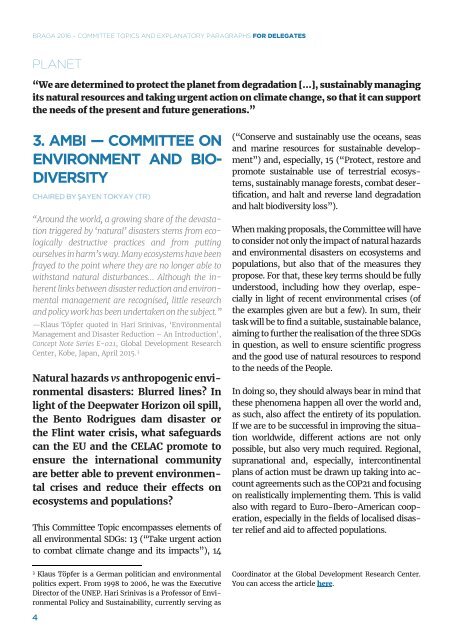Braga 2016 - Committee Topics and Explanatory Paragraphs for Delegates
Create successful ePaper yourself
Turn your PDF publications into a flip-book with our unique Google optimized e-Paper software.
BRAGA <strong>2016</strong> – COMMITTEE TOPICS AND EXPLANATORY PARAGRAPHS FOR DELEGATES<br />
PLANET<br />
“We are determined to protect the planet from degradation […], sustainably managing<br />
its natural resources <strong>and</strong> taking urgent action on climate change, so that it can support<br />
the needs of the present <strong>and</strong> future generations.”<br />
3. AMBI — COMMITTEE ON<br />
ENVIRONMENT AND BIO-<br />
DIVERSITY<br />
Ş<br />
“Around the world, a growing share of the devastation<br />
triggered by ‘natural’ disasters stems from ecologically<br />
destructive practices <strong>and</strong> from putting<br />
ourselves in harm’s way. Many ecosystems have been<br />
frayed to the point where they are no longer able to<br />
withst<strong>and</strong> natural disturbances… Although the inherent<br />
links between disaster reduction <strong>and</strong> environmental<br />
management are recognised, little research<br />
<strong>and</strong> policy work has been undertaken on the subject.”<br />
—Klaus Töpfer quoted in Hari Srinivas, ‘Environmental<br />
Management <strong>and</strong> Disaster Reduction – An Introduction’,<br />
Concept Note Series E-021, Global Development Research<br />
Center, Kobe, Japan, April 2015. 3<br />
Natural hazards vs anthropogenic environmental<br />
disasters: Blurred lines? In<br />
light of the Deepwater Horizon oil spill,<br />
the Bento Rodrigues dam disaster or<br />
the Flint water crisis, what safeguards<br />
can the EU <strong>and</strong> the CELAC promote to<br />
ensure the international community<br />
are better able to prevent environmental<br />
crises <strong>and</strong> reduce their effects on<br />
ecosystems <strong>and</strong> populations?<br />
This <strong>Committee</strong> Topic encompasses elements of<br />
all environmental SDGs: 13 (“Take urgent action<br />
to combat climate change <strong>and</strong> its impacts”), 14<br />
(“Conserve <strong>and</strong> sustainably use the oceans, seas<br />
<strong>and</strong> marine resources <strong>for</strong> sustainable development”)<br />
<strong>and</strong>, especially, 15 (“Protect, restore <strong>and</strong><br />
promote sustainable use of terrestrial ecosystems,<br />
sustainably manage <strong>for</strong>ests, combat desertification,<br />
<strong>and</strong> halt <strong>and</strong> reverse l<strong>and</strong> degradation<br />
<strong>and</strong> halt biodiversity loss”).<br />
When making proposals, the <strong>Committee</strong> will have<br />
to consider not only the impact of natural hazards<br />
<strong>and</strong> environmental disasters on ecosystems <strong>and</strong><br />
populations, but also that of the measures they<br />
propose. For that, these key terms should be fully<br />
understood, including how they overlap, especially<br />
in light of recent environmental crises (of<br />
the examples given are but a few). In sum, their<br />
task will be to find a suitable, sustainable balance,<br />
aiming to further the realisation of the three SDGs<br />
in question, as well to ensure scientific progress<br />
<strong>and</strong> the good use of natural resources to respond<br />
to the needs of the People.<br />
In doing so, they should always bear in mind that<br />
these phenomena happen all over the world <strong>and</strong>,<br />
as such, also affect the entirety of its population.<br />
If we are to be successful in improving the situation<br />
worldwide, different actions are not only<br />
possible, but also very much required. Regional,<br />
supranational <strong>and</strong>, especially, intercontinental<br />
plans of action must be drawn up taking into account<br />
agreements such as the COP21 <strong>and</strong> focusing<br />
on realistically implementing them. This is valid<br />
also with regard to Euro-Ibero-American cooperation,<br />
especially in the fields of localised disaster<br />
relief <strong>and</strong> aid to affected populations.<br />
3<br />
Klaus Töpfer is a German politician <strong>and</strong> environmental<br />
politics expert. From 1998 to 2006, he was the Executive<br />
Director of the UNEP. Hari Srinivas is a Professor of Environmental<br />
Policy <strong>and</strong> Sustainability, currently serving as<br />
Coordinator at the Global Development Research Center.<br />
You can access the article here.<br />
4


